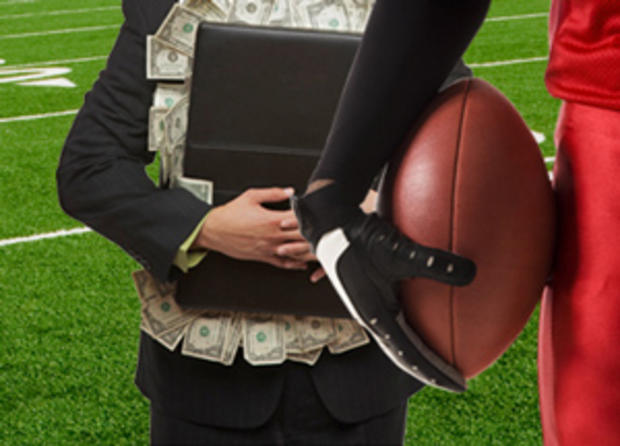Why CEOs Are Overpaid, and NFL Stars Aren't
Every time there's a stock market meltdown big enough to wreck the real economy—and we've seen quite enough of that recently, thank you—the hunt for scapegoats leads to executive compensation. We pay our top executives too much, goes the argument, and worse, we give them all the wrong incentives. We reward leaders for taking risks and fudging numbers and then are shocked when reckless leverage and shady accounting cause a crash.
Giving stock to executives is supposed to align their interests with those of the shareholders. What's wrong with that?
It makes sense, in theory: Managers get rich only if shareholders get rich, too. But look at how it has worked out. Over the past couple decades shareholder returns went down, volatility went up, and we've had massive bubbles and massive accounting fraud. You'd have to conclude there's something wrong with our model
So what is wrong with it?
Paying executives on stock performance pushes them away from the real market—where customers are the focus and a leader's job is to find better ways to serve them—to the expectations market, where the leader's job is to manipulate Wall Street's expectations about the company.
People just don't realize what a company's stock price is. It's the collective expectation of what that company will do in the future. It has very little to do with how a company really performs. Look at Microsoft. The company has tripled earnings and revenues over the past decade and the stock is completely flat, earning a 1.3% compound annual return. Microsoft performed way better than it did a decade earlier and investors say, "Ho hum, we expected that."
So the CEO's job is to beat expectations.
Not just to beat them, but to change them. The only way an executive can raise the stock price is to make expectations rise from their current level.
When stock-based comp came in during the early 80s, Executives were in some sense fooled by the same thing as everyone else. They figured, "My job is to increase earnings."
In due course, they figured it out: "Oh no, not that way. I have to make expectations rise." So in the early 1990s, you saw the advent of earnings guidance. Eventually some executives decided, "We can do some sharp accounting, so it looks like we're growing faster than we are, and we'll do acquisitions that make it look like we're growing like stink." By the 1990s, in the worst cases, it evolved into "We'll manipulate earnings to commit massive fraud." Welcome to Enron and WorldCom.
The other problem is, you can´t make expectations rise forever. So phase three of CEO reaction to stock-based pay is to build expectations to a short-term peak, and then get the hell out.
In your book, you compare corporate comp and the NFL pay. Professional football players aren't exactly cheap, either.
No but the NFL, unlike corporate America, has faced up to the dangers of letting the expectations game interfere with the real game.
An expectations market in football?
It's there. It's called the spread, and it matters to gamblers. After the 1962 season, the legendary commissioner Pete Rozelle suspended Alex Karras, a star tackle, Paul Hornung, the league's MVP, for a full season on suspicion of gambling on football games. He saw that the expectations market could wreck the integrity of the real game. His successors have followed suit and maintained a strict separation between the real market and the expectations market.
Can you imagine Peyton Manning or Aaron Rogers in the press conference after a football game, apologizing for not covering the spread? "I owe all of you Colts' fans an apology. Yes, we won, but I've let you down: We didn't beat the spread. I'm sorry, I'll try harder next time."
That would be laughable. It would be preposterous. But it's what CEOs do every quarter.
So it's unseemly, but what's the real harm?
Before 1976 when stock –based compensation was proposed as a way to align CEOs' interests and shareholders' you just can't find examples of really massive accounting fraud.
You only start to see that in the mid-1990s, and inevitably, the purpose of the fraud was to boost the appearance of profitability growth. Remember it's not enough to increase profits on a straight line. You have to change the slope of the line to get expectations up and make stock prices rise.
So, the so-called SPVs at Enron, which allowed the company to re-categorize expenses as assets—they were an attempt to change the slope of the line.
Acquisitions, especially ones in which you capitalize all sorts of expenses, are another example. So was the options backdating scandal and the long-running practice of not accounting for stock options as expenses. Lehman Brothers hiding the leverage on their balance sheet. These are all ways of fixing the expectations game. We've evolved to the point that it's all we care about.
What would you have companies do differently?
I'd have them measure CEOs by some real measure of company performance—not the stock price—and pay them in cash.
Actually, I wouldn't care if you paid them in stock, but I'd stipulate that the pay has to be in shares that can't be traded or borrowed against for three years after he left the company.
Paying people in stock ex post facto is like cash. It's paying them on the basis of what they've really accomplished, not on their ability to shift expectations.

Fixing the Game: Bubbles, Crashes, and What Capitalism Can Learn from the NFL by Roger L. Martin

